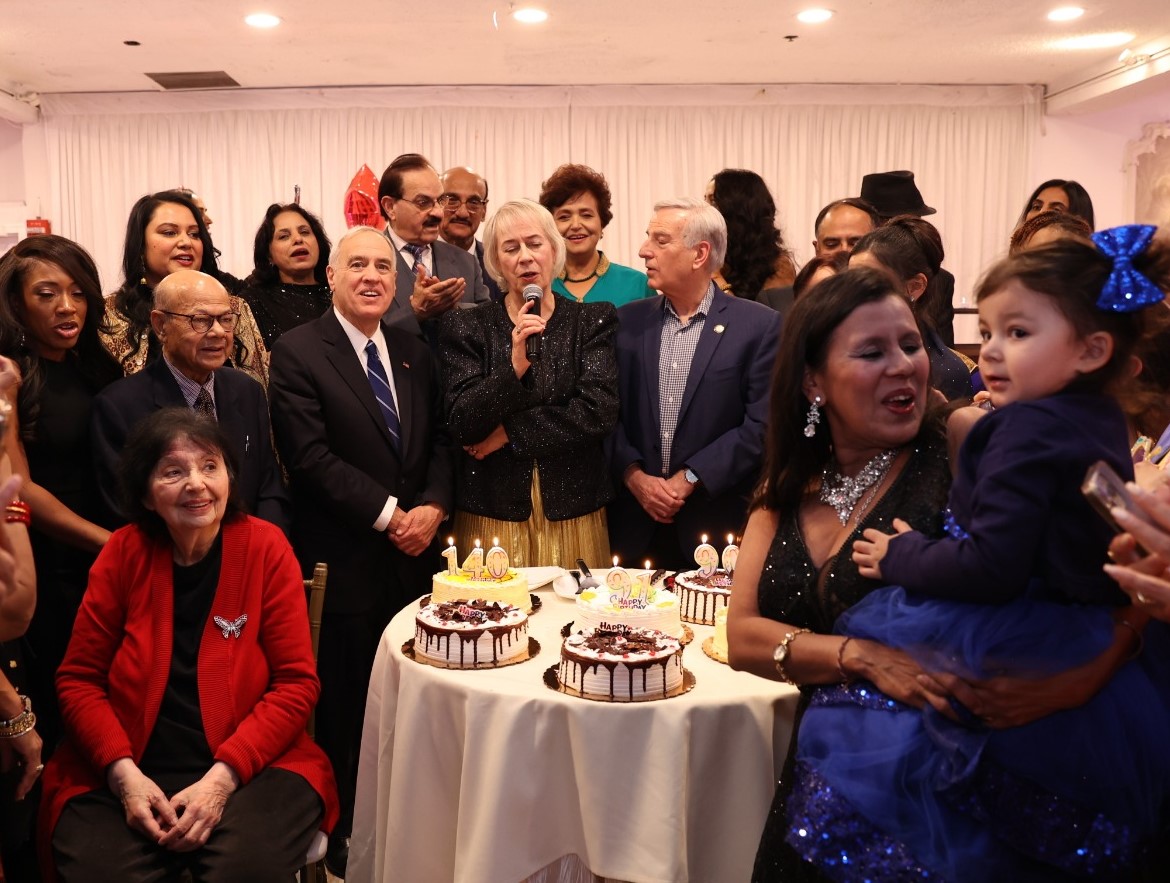By David Noh
Beatty kissing Betty; remembering Brando; too much frou-frou
“Your talent lies in your choice,” was the mantra my late acting teacher, Stella Adler, would exhort in her never-to-be-forgotten classes, so what else could I do but attend the annual gala in her memory, “Stella By Starlight,” at the Pierre Hotel?
I lived in terror of this acting guru when I was at NYU, lurked at the back of the classroom, but had one memorable encounter with her. On one occasion, her assignment was for everyone to bring in a favorite song to perform. I was too nervous to sing anything, but, after too many bad renditions of “The Impossible Dream” and “Hello, I Must Be Going,” decided to steel myself and do Gershwin’s “‘Swonderful” for her.
Adler actually approved, and even made me sing it again, but this time with her playing the part of my sweetheart. Although well into her 70s at the time, the years melted away as she batted her enormous false eyelashes at me and dimpled demurely, and I can truly attest, as so many already have, that she really was one sexy lady.
The event, held November 8, as always, was a wonderful mix of Hollywood star power as well as New York theatre family coziness, with awards going to Tony Kushner (presented by Mike Nichols), Arthur Miller, and, posthumously, Marlon Brando (presented by Warren Beatty), for consummate artistic achievement.
An army of paparazzi practically killed each other over a photo op of Beatty kissing Lauren Bacall, and he worked the press line with Old Hollywood Studio-trained aplomb, flirting with the female reporters while fending off inane questions like “What was Marilyn Monroe’s legacy?” and “Tell us your beauty regime.” In the lobby, I locked eyes with Jessica Lange, arriving with Mikhail Baryshnikov, and had a wonderfully warm encounter with her, all too brief, as her escort hastily yanked her away. Indeed, one couldn’t help but feel that, this night, Baryshnikov rather resembled the arrogant, humorless character he played on “Sex and the City.”
When Lange realized she would have to face photographers, she ducked into the powder room to freshen up and, with the door ajar, we were all able to witness one of the world’s great beauties, un-self-consciously fluffing herself before the full-length mirror while the ladies present swooned around her. She emerged, looking like the proverbial million bucks, only to have Baryshnikov drag her quickly behind the backs of the paparazzi, thereby nixing any chance for a single shot of them together. While we were waiting for her, I tried to engage this danseur noble in conversation, congratulating him on his recent $100,000 Jerome Robbins Award and asking after his daughter by Lange, Alexandra (named after the great prima ballerina, Danilova). The iciness with which these overtures were met could only be described as Siberian.
Apart from this, the occasion was truly one of overwhelming warmth, from the informal musical tribute to the late Fred Ebb by Melissa Errico, Brent Barrett and Marin Mazzie, to the witty speeches by Nichols, Beatty, producer Mike Medavoy and Whoopi Goldberg (who was, surprisingly, a close friend of Brando’s). Mazzie sang “Ring Them Bells,” and hilariously made sure to shake her generously unfettered breasts with every mention of those three words. She and Erricoe dueted on “The Grass is Always Greener,” as Bacall, who introduced it in “Woman of the Year” watched approvingly, especially at the lines “Eating at the White House/That’s wonderful/What’s so wonderful?/Four more years-auugh!”
Beatty reminisced about the lengthy, late night telephone conversations he’d share with Brando, which would largely consist of their trying to recall show tune lyrics (“like two old chorus girls”) and people’s telephone numbers. Goldberg touchingly recalled how she could never quite accept the fact that Brando considered her a pal and, therefore, didn’t call him as much as she should have.
I spoke with Brando’s son, Miko, who told me, “What people don’t realize about my father is that he was a very simple man. I work for Michael Jackson now, and he and my Dad are very much alike, both geniuses, very smart, but very simple. You can’t imagine what it was like to sit around at night with those two, listening to them talk. He was a great father, too. He had 11 children, I have all these step-siblings and we all get along!”
Miko’s mother is the actress Movita Castaneda, who, he reminded me, played the same role of the native girl in the 1935 “Mutiny on the Bounty,” as Brando’s last wife, Tarita Teriipia, did, opposite him in the 1962 remake.
Patti Lupone brought her act, “The Lady With the Torch, Part II,” which everyone assures me is a warm-up for her upcoming Carnegie Hall concert, to Feinstein’s at the Regency. It was a total orgy for Lupone addicts, with the diva in splendidly resonant voice on immortal songs of yearning and ache, like “Do It Again, My Buddy,” “So In Love” and, especially, the magnificently dark “Body and Soul” in a performance November 9. I missed her triumphant “Encores! Can Can” appearance, so it was marvelous to hear her lullingly definitive renditions of Cole Porter’s “I Love Paris” and “C’est Magnifique.” The audience kept calling her back for encores, screaming “‘Evita!’ ‘Anything Goes!’ ‘Sunset Boulevard!’” She sang an a capella “I Get a Kick Out of You,” and, at the behest of her director, Scott Wittman, a rocking “The Way You Look Tonight.”
Hard-core musical queens might have been slightly disappointed by “Taboo” star Euan Morton’s opening night November 10 at Zipper Theatre, as he sang only three show tunes—a song from “Caligula” (which Morton will star in this spring, in San Francisco), an exquisitely plangent “Ev’ry Time We Say Goodbye” (Cole Porter), and, from “Taboo,” one of Boy George’s quite wonderful ballads. But true rockers would have lapped this show up, as, backed by a terrifically tight 4-piece band, Morton gave a spiritedly intense performance that positively smoked. Rosie O’Donnell and partner Kelli Carpenter looked on, like very fond mother hens, as Morton worked his astonishingly versatile voice—one of the greatest around today—six ways from Sunday, especially on a triumphant version of, of all things, Neil Diamond’s “America.” Morton has the imperially easy stage presence of a true star, whether screwing up a lyric due to, as he put it, his being sober, then crying out for Jack Daniels, or planting an outrageously fond kiss on the mouth of his talented lead guitarist, David Matos. “Now get me a fucking green card!” this wild Scot shrieked at the end of his set, and Immigration would be wise to hop to it.
There wasn’t much magic in evidence in New York City Opera’s new production of Rodgers and Hammerstein’s “Cinderella.” Low camp would best describe what went on at the premiere at the State Theatre last Friday night. Perhaps assembling a cast including John “Lypsinka” Epperson, Lea DeLaria, Ana Gasteyer, Eartha Kitt and Renée Taylor was laying on the frou-frou fabulousness a bit too thickly to begin with, but matters were not helped by Baayork Lee’s tackily uneven direction. These performers all seemed to be plying their variously familiar, individual schticks in a simultaneous collective of onstage solo shows.
Actually, Epperson emerged as the one cast member with any real style appropriate to the material, with an impressively forceful voice (after all those years of lip-synching!) and Baroque gesticulations worthy of Restoration comedy. He even managed to incorporate a ubiquitous Joan Crawford-“Mommie Dearest” reference that, given his role as Wicked Stepmother, decidedly worked in character.
DeLaria way overdid the galumphing butch routine as a Stepsister, Kitt seemed to be distressingly left to her own devices (and much too barely costumed as the Fairy Godmother) and Taylor was a pure embarrassment as a very Grand Concourse Queen Mother, with zero singing voice. As the Prince and Cinderella, Christopher Sieber and Sarah Uriarte Berry, although, physically, very graceful, didn’t have quite the musical chops for their songs.
One dearly missed the iridescent clarity of Julie Andrews and, even, Lesley Anne Warren, who sang Cinders in the TV versions of this show.
Some of the sets and costumes were pretty enough, but the ball transformation scene was dead on arrival. As for those two mincing, “adorably” prancing mice who dogged Cinderella’s every solo move, I only wished the set designers had built a large rat trap onstage for them. The audience, however, which seemed to be entirely devoid of a single heterosexual man, lovingly lapped it all up like crème fraiche.
Contact David Noh at Inthenoh@ aol.com.
WWW Downtown Express



































